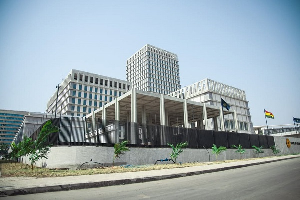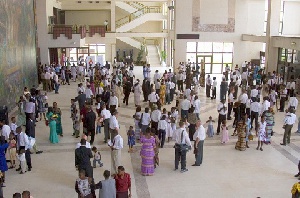By Kwame Okoampa-Ahoofe, Jr., Ph.D.
It washer amusingly annoying to hear G rathana’s longtime strongman, Mr. Jeremiah John Rawlings glibly blame the pilot of the Nigerian cargo plane that crash-landed at the sole international airport in Accra over the weekend (See “Rawlings Blames Plane Crash on Poor Judgment” Ghanaweb.com 6/4/12). In crash-landing, the Boeing 727 cargo plane, with the legend of 5N-BJN spray-painted on its fuselage, rammed a Mercedes Benz 207 commercial minivan loaded with passengers on the nearby highway. At least 12 passengers in the minivan were reported to have lost their lives.
Mr. Rawlings probably felt tempted to volunteer premature judgment because only a few hours earlier, his own plane had reportedly landed successfully at the Kotoka International Airport (KIA), where the grisly tragedy involving the Nigerian-owned cargo plane occurred. Anyway, about the only common denominator here is the fact that both the plane carrying Ghana’s former president, himself a remarkable air-force pilot, and the Nigerian cargo plane had landed after a heavy downpour in the vicinity of the airport.
Evidently, the early evening’s downpour had caused considerable flooding of the runways at the Kotoka International Airport. It was this patent aviation hazard that prompted Mr. Rawlings to so cynically remark about the apparent lack of experience on the part of the pilot of the Boeing 727 cargo plane, originating from Nigeria’s commercial capital of Lagos. We also learn from a report sourced to Peacefmonline.com, website of the quite well-known privately-owned Ghanaian radio station, that Mr. Rawlings had rushed to the aid of the pilot of the plane on which he landed at KIA, because the evidently relatively younger and less experienced pilot was having difficulties landing at the airport.
Essentially, what prompted me to rejoin with this article is the former president’s rather facile and presumptuous assertion that the pilot of the Nigerian plane could have wisely refused to land in such bad weather. Needless to say, Mr. Rawlings, a retired flight-lieutenant of the Ghana Air Force, may be perfectly sound and even accurate with his judgment, except for the one significant fact that at the time that he rather volubly volunteered his judgment, no investigation had been conducted to find out precisely what caused the Boeing 727 cargo plane to crash land and, in the process, cause such considerable mayhem and unnecessary loss of lives.
For starters, the pilot of the cargo plane could have been forced to land where and when he did, because his vehicle did not contain enough fuel to carry him and his crew to the nearest airport in good weather. And the nearest “landable” airport could have been in the Ivorian capital of Abidjan, some 200-odd-miles away, or even Lagos, the origination of the flight. Which brings up the very relevant question of the imperative need for Ghana to both upgrade the present structural quality of the KIA, as well as establish at least two or three more commercial airports of international caliber, in order to ease up both congestion and preventable emergency situations such as the one involving the Nigerian-owned Boeing 727 cargo plane.
On the latter score, perhaps Mr. Rawlings’ “expert opinion” would be more relevant, and even laudable, if the man who ruled Ghana for 19 years, both as a military dictator and an elected president, had cared to explain to his audience precisely why his two lengthy administrations appear to have done virtually nothing to remarkably upgrade the country’s aviation standards. In other words, very likely, Mr. Rawlings’ own woeful lack of responsible leadership in the imperative development of Ghana’s aviation industry, may well have significantly contributed to the tragic and horrific accident caused by the Nigerian-owned Boeing 727 cargo plane, as well as any others before it in recent years.
We also do not know the age and flight record of the Boeing 727 pilot to enable anybody, including Mr. Rawlings, of course, to jump to the rather facile conclusion that it was, in fact, the “poor judgment and poor skills” of the pilot that caused the accident. For all anyone cares to know, the good judgment of the pilot may well have considerably meliorated the magnitude of both the damage and loss lives caused by his decision to crash-land his plane.
Another significant factor may well have involved a technical glitch over which the pilot had very little or absolutely no control, whatsoever. Then also, we do not have any authenticated transcript of the communication between the control tower at the Kotoka International Airport and the pilot of the Boeing 727 cargo plane, in order to be able to make any meaningful judgments or draw any intelligent conclusions as to what might have actually occurred.
In brief, it is the most salient of the preceding questions whose definitive answers we ought to hope to learn about and be able to remedy in the days and weeks ahead.
*Kwame Okoampa-Ahoofe, Jr., Ph.D., is Associate Professor of English, Journalism and Creative Writing at Nassau Community College of the State University of New York, Garden City. He is Director of The Sintim-Aboagye Center for Politics and Culture and author of “Ghanaian Politics Today” (Lulu.com, 2008). E-mail: okoampaahoofe@optimum.net. ###
Opinions of Wednesday, 6 June 2012
Columnist: Okoampa-Ahoofe, Kwame














